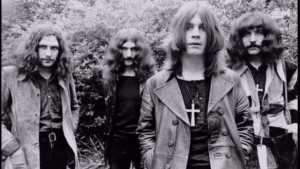Why Stevie Nicks Didn’t Want To Release One Album

via Alex61 / Youtube
In the landscape of rock and roll, few names shine as brightly as Stevie Nicks. Her tenure in Fleetwood Mac and an enviable solo career have cemented her position in music history. Yet, amidst the many highs, one period stands out as a particularly challenging episode — the creation and subsequent release of the album “Street Angel”. This chapter reveals the tension between artistic integrity and the harsh realities of the music industry.
From Fleetwood Mac to ‘Street Angel’
Creating music within the ecosystem of Fleetwood Mac was no small feat, given the immense talents within the group. Contending with Lindsey Buckingham’s pop prowess and Christine McVie’s compelling ballads meant that Nicks had to fight for her songs’ inclusion. Her decision to embark on a solo career offered a fresh canvas, yet “Street Angel” fell short of her aspirations, far from the triumph she had imagined.
Nicks’s approach to songwriting diverged from traditional methods, relying less on instrumental composition and more on an emotionally driven process. With Buckingham playing a crucial role in the early Fleetwood Mac recording sessions, their joint efforts often delved into the complexities of their fraught relationship. As time progressed, Buckingham’s involvement waned, particularly during the development of “Tusk”, yet Nicks had already solidified her status as a formidable artist.
Her solo ventures allowed Nicks to explore her mystical inclinations, with “Bella Donna” showcasing her as a formidable hitmaker on tracks like ‘The Edge of Seventeen’. Despite the newfound freedom, Nicks grappled with personal challenges, notably her struggle with cocaine addiction. This battle took its toll, with Nicks later reflecting on her inability to recognize herself in performances during this era. Sobriety eventually came, prompted by a dire warning about her vocal health, but it coincided with tumult within Fleetwood Mac, leading to Buckingham’s departure.
View this post on Instagram
A Struggle with Personal Demons and Artistic Integrity
“Street Angel” was born out of tumultuous times, with Nicks’s reliance on prescription pills casting a long shadow over the album’s production. The process was marred by dissatisfaction, and despite sobering up midway, the results failed to meet Nicks’s standards. Financial constraints prevented discarding the recordings outright, leading to the album’s reluctant release. A brief tour ensued, but it was Fleetwood Mac’s reformation for Bill Clinton’s inauguration that overshadowed “Street Angel”‘s existence.
Nicks’s disappointment in the album is palpable, as articulated in “Gold Dust Woman”: “I’d been taking Klonopin for almost eight years. ‘Street Angel’ was done in the last two years of that when it kicked in to the point where I lost my soul and creativity…I listened to the record, and I knew it was terrible. It has cost a fortune.” Her relationship with the album remains fraught, with little likelihood of its tracks featuring in future performances.
Despite the adversity surrounding “Street Angel”, Nicks’s career experienced a resurgence with “The Dance”, rejuvenating interest in her Fleetwood Mac era. This revival brought Nicks and her bandmates squarely into contemporary relevance, embarking on a global tour that solidified their legacy.











